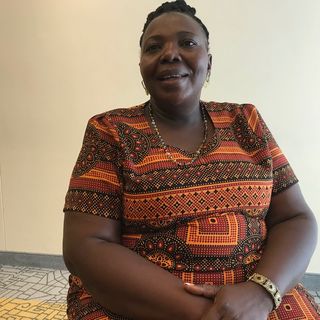Health
Global Mental Health: Two Zimbabwean Initiatives
How to foster mental well-being through community.
Posted March 17, 2020
As a program coordinator for the Australia Awards Africa Program, which addresses the needs of mental health workers from across Africa, I have been fortunate to learn about some innovative initiatives developed in Africa. Notwithstanding the limited resources in low-income countries, imagination has no bounds.
In this blog post, I will focus on two mental health initiatives from Zimbabwe. One is The Friendship Bench, initiated by Dr. Dixon Chibanda, and the second is the Queen of Peace Mental Health Initiative by Stella Gaihai.

By way of background, Zimbabwe is a landlocked country, next to South Africa’s northern border. The country gained independence in 1980. The rule of Mugabe has been controversial and associated with a lack of governance, large scale poverty, hyperinflation, the impact of AIDS, and poor and unequal distribution of workers within the public health sector.
To provide a metric of services available for people with mental health issues: Zimbabwe has less than 20 psychiatrists for a population of around 15 million people. According to the Zimbabwe Association of Doctors for Human Rights (ZADHR), an estimated 600,000 people suffer from debilitating mental illness. Neuropsychiatric disorders contribute to 3.1% of the global burden of disease in Zimbabwe (WHO,2008).
The Friendship Bench

As part of the Australia Awards Africa, I had the pleasure of participating in a forum in Cape Town in November 2019, during which Dr. Chibanda presented his ideas and progress made in addressing mental health in Zimbabwe. The program is unique in the fact that Dr. Chibanda has not simply translated a program from “the West” and implemented a program in his context; rather, he has thought about the objectives of the program and the context of his own society. The program is referred to as The Friendship Bench.
Dr. Chibanda recently presented his work on the development of The Friendship Bench at a talk in Cape Town to mental health workers in South Africa and attendees of an Australia Awards program, addressing Mental Health Care in a Public Health Context. Interestingly, the program has had influence internationally, and its impact and effectiveness are supported by research.
The Friendship Bench is an innovative mental health program initially aimed at addressing the treatment gap for common mental disorders in Zimbabwe. It may be thought of as a community development project, involving trained lay workers, referred to as “grandmothers,” who give their time to help people presenting with a range of difficulties.
The name refers to the literal placement of a bench in the grounds of a clinic, allowing for the lay worker to engage with the person seeking assistance. The mission of the program is the creation of “safe spaces and a sense of belonging in communities so as to enhance mental well-being and improve quality of life through the use of problem solving therapy delivered by trained lay health workers.” The initial focus has been on people suffering from common mental disorders, such as anxiety and depression, referred to as kufungisisa; which is translated as referring to "thinking too much," deep sadness, referred to as kusuwisisa, and a painful heart referred to as moyo unorwadza (Chibanda, D et al . 2011).
The motivation for the program was the large number of distressed people with mental health issues following the Operation Murambatsvina (Move the Rubbish) in 2005, a program in which people were forcibly removed from their homes. The program was seen as a slum clearance. It affected over 700,000 people directly, and indirectly, around 2.4 million people.
Resources were limited and Dr. Chibanda’s initiative was a simple and inexpensive way of trying to help people with mental health problems, that is, a grandmother with training, sitting on a bench with the client and listening to their story. What was also important was that this project could be scaled up. The Friendship Bench is now operating in a number of countries.
Dr. Chibanda chose grandmothers, he said, because they are reliable, rooted in their communities, have a wealth of wisdom and give good hugs! He started with 14 grandmothers who received CBT-based training. Three steps were involved: The first step is “Opening the Mind,” which involves listening to the person, the second step is “Uplifting,” involving summarizing the story and asking the person to select one issue that they would like to work on, and the third is “Strengthening,” which involves breaking down the problem and providing a plan. He highlighted that it is important to give clients something to take away with them. The person may make a follow-up appointment, but if not, the grandmother may follow up by sending a message.
Referrals may come from clinics, hospitals, or people may be self-referred with assessment tools used to assess whether the person is suitable for this form of intervention. Dr. Chibanda referred to research demonstrating the effectiveness of The Friendship Bench treatment in reducing symptoms of depression.
The program is appropriate for the African culture, that is, to have someone who is respected and non-threatening to listen to the person’s story. After all, people want to be listened to, affirmed, and validated. The client has the power to choose what they want to work on even if the grandmother felt that the issue was not the most important one for the person. Sitting on a bench in the open is a wonderful way to relax and for the person to feel at ease instead of attending a clinic and perhaps sitting in a crowded room, waiting to be seen. It provides a great atmosphere for the person. It is also wonderful that the grandmothers can perform this meaningful role in their community hence the term “Friendship.”
The Queen of Peace Mental Health Initiative

A second program, also drawing upon the mental health initiative in Zimbabwe is the Queen of Peace Rehabilitation and Crises Centre. The organisation, formed in 2009, is an NGO whose mandate is to provide residential rehabilitation programs and reintegrate people with mental health challenges into society. The ethos is to foster resilience through the promotion of mental health well-being, mental health education and advocacy, life skills training, vocational skills training for self-sustenance, and activities fostering reintegration into the community.
The organisation is currently planning the Mental Health and Wellness Games in the Midlands Province in May 2020 for people with mental disabilities. This will be a national event involving all provinces and mental health institutions in Zimbabwe. The purpose is to integrate mental health into other health care services where health, psychosocial well-being, and development partners can display and offer various healthcare and well-being support services including non-communicable diseases (NCDs), HIV, and family planning with health and development issues. The approach reinforces mental health advocacy, thus strengthening community action.
This event is designed to enable mental health consumers to:
- Raise awareness by bringing mental health issues out of the shadows.
- Promote general fitness: All individuals require exercise, regardless of disability.
- Promote social interaction: Socializing is important to all people but can be especially therapeutic for individuals with disabilities.
- Encourage emotional well-being: Games developed specifically for individuals and children with mental health challenges help them feel included and hopefully inspired.
- Improve confidence: People with mental health issues may overcome some of the issues resulting from stigma and gain confidence from their experience and mastery of the sport.
Interacting with others may make it easier to cope with challenges while also providing a larger support system for participants. Participation also contributes to the development of leadership skills.
Reflecting on both these initiatives in the context of coronavirus and its impact upon our communities affirms the human capacity to address psychosocial challenges in the face of adversity, low-resources, and often, a lack of encouragement from centralized health systems. As a practitioner in a high-resource country, I am very aware of the complexity of psychological interventions in a context where we argue for the importance of promoting mental well-being by encouraging people to foster social relationships, that is, to have a friend or family member to talk to within their community and to participate in community activities. There is clearly much to learn from other cultures and communities including those in Africa with its strong sense of belonging irrespective of the adversity often confronted by people in these contexts.
References
Chibanda, D., Mesu, P., Kajawu, L. et al. Problem-solving therapy for depression and common mental disorders in Zimbabwe: piloting a task-shifting primary mental health care intervention in a population with a high prevalence of people living with HIV. BMC Public Health 11, 828 (2011). https://doi.org/10.1186/1471-2458-11-828




